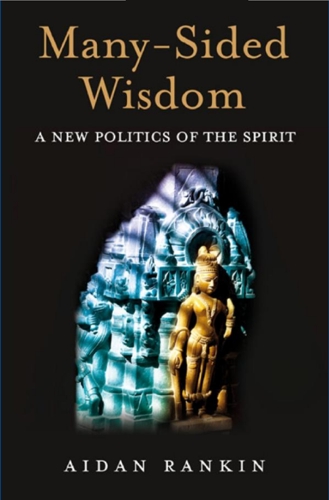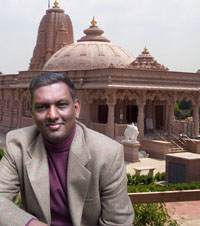 | MANY-SIDED WISDOM: A New Politics of the Spirit by Aidan Rankin |
In the huge cacophony of noise and pollution that is the modern media, it is rare to find a new work which is written with patience and perseverance, where the author has laboured over his thoughts and researched them for years (decades even) before putting them to print. This new book flows like a timeless river, respects its readers very deeply, and unites a wide range of disciplines from politics to ecology, spirituality, philosophy and economics so flawlessly, that we feel we are truly being touched by wisdom which has stood the test of time.
We live in a time where luxury is being eroded - there is the threat of global warming and the reality of climate change, war is always around the corner, and the rich are also the most anxious and dis-satisfied, whilst the poor only fall ever-lower, and population rises. Science, the objective saviour, is not able to solve these problems for us. Neither is Capitalism. The word ‘holistic' is increasingly being talked about as the way forward - where silos or barriers between thoughts or organisations need to be broken, and we need more co-operation and less competition. And the ancient Indian Jain tradition is one of the foremost exponents of the richness and depth of holistic thinking, action and science. Rankin draws on this in his book.
The book comprises six chapters, with titles ranging from ‘Letting Go of Dogma', to ‘A Subtle Power', ‘Karmic Ecology' and ‘Growing Beyond Growth'. It is aimed at a reader who is keen to discover wisdom, to unite the multiple worlds of mind, body and spirit, and willing to invest some time and effort in reading and understanding profound voices. He makes the task very easy for the reader by using prose which is effortlessly smooth and flowing, concise and poetic, focused yet liberating. I definitely felt very uplifted when I finished the book - a sense of personal growth and inner peace and understanding, which I hope will stay with my soul forever.
Rankin firmly places his book on the Jain wisdom of ‘Anekant' or Many-Sidedness. This is a complex idea, which demonstrates that truth has multiple-facets, and depends on the position of the seeker and their assumptions and world-views, explicit or implicit. This is not the same as relativism, where there is no objective truth, but neither is it purely rational, or purely spiritual or purely emotional. The Jains allow all these perspectives to cohere, and in their philosophy of maybe-ism (Syadvada), show that truth can be tentative, but must be sincere, non-violent, and respectful of all living beings and their rights to co-exist. We should seek objective truth, but should not be fundamentalist about the process or the outcome, and also listen to other perspectives respectfully. He demonstrates the fundamental weakness of human-centric science and ideology, which is so paralysing and disrespectful of nature and its awesome intelligence and richness.
In my work through the social enterprise Diverse Ethics (where Aidan is a colleague), I seek to practice my Jain heritage quietly, and show leaders, organisations and individuals, the beauty of the timeless wisdoms of the world, and how they can enrich our present life here and now. I encourage people not to get drawn by the pretence and lack of authenticity of so many modern experts, who are usually solely after the money, and instead look to cultures, communities and wisdoms to seek sustainable truths and solutions. For example, I am on the Board of the Museums, Libraries and Archives Council, and recently invited Executives and Board members to participate in an Ancient Jain Ayambil Festival and have their Board meeting[1] in the Jain Temple Complex in London. This gave them the opportunity, not just to see the stone sculptures and temple, but also the living heritage in the faces of the 300 people who attended the festival. The whole experience was very rewarding for everyone, and something they will remember for a long time. It affected them at multiple levels, and enabled them to see their own world from a different lens. In the process, everyone was enriched, including the Jains.
Modern education is premised on fundamentalist world-views about dualism, nature, materialism and the separation of mind, body and spirit. Subjects are there to dissect the truth, rather than to see its wholesome spirit and inter-connectedness. In the process, even people become easily violent as they get sucked in by consumerism and the obsession with growth. Minds become greedy, selfish and stressed, producing actions which are violent in nature and divisive in spirit. Instead, Aidan talks about truth which involves detachment, simplicity, humility and selflessness, a truth that seeks to build communities and connect peoples. He examines the ethics of Science.
Whilst ‘racism' is not a word people like to read or talk about, there is a subtle racism in thought and science too. It centres around the obsession with euro-centric philosophy and science, the subtle ideals of white supremacy and ‘civilisation', and most importantly, the obsession with the human condition and the total disregard for nature and its own intelligence and wisdom. As a University student, none of my Lecturers showed interest in my faith and culture, nor my own world-view. Identity was there to be stamped upon, by the quest for ‘objective' science, which has already stamped upon plants, forests, insects and animals. In spite of globalisation, our minds today are still very closed and suspicious of difference.
The uniqueness of this work is that Aidan is a ‘white' Englishman born and raised in Britain, educated at Oxford and LSE (PhD in Politics), and yet highly respectful of the wisdoms of the East, and someone who has clearly spent a lot of time and energy in deciphering and translating them. His very life shows how we can transcend our barriers and histories of prejudice, and have the huge opportunity in this age to learn, grow and enrich the quality of our lived experience. In fact, his work hugely enriches the Jain faith and philosophy, as he places it into a context of modern life, which we as a community are ourselves struggling to relate to. He gives hope to our youth, a language to connect their inner and outer experiences, and ways of expanding their horizons through anekant.
I strongly recommend thought leaders and wisdom seekers, to embark on the journey of reading and experiencing this book. Let it simmer, reflect on it, and have small group discussions around its contents. It will help you cultivate a mind which is borderless and action which is peaceful and fulfilling. In the process, others will want to tap your wisdom and ripples will grow ever larger.
 Dr. Atul Keshavji Shah
Dr. Atul Keshavji Shah